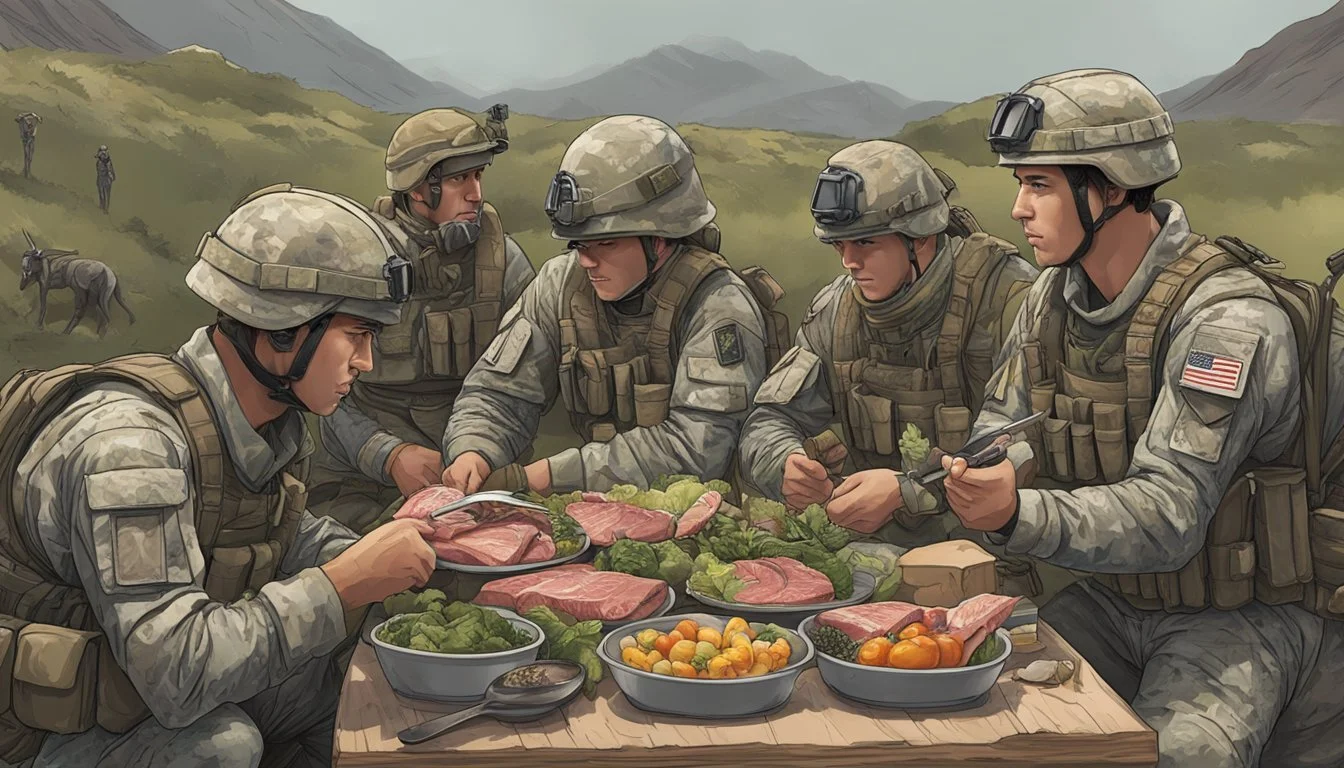The Carnivore Diet for Soldiers
Enhancing Combat Endurance and Resilience
The carnivore diet, characterized by its exclusive focus on animal products, is gaining traction among diverse populations, including soldiers. Purported to enhance physical endurance and mental resilience—attributes critical to military personnel—the diet eliminates carbohydrates and prioritizes high intakes of protein and fats from meat and other animal sources. Advocates claim that such a nutrient profile can sustain prolonged physical exertion and aid in faster recovery, aspects of considerable interest to those in the armed forces.
However, the adoption of a carnivore diet by soldiers presents unique challenges, particularly in field environments where access to fresh meat may be limited. Practical considerations, such as the need for non-perishable food options, have led to innovative solutions like dried meats combined with sources of fat, aiming to deliver the requisite energy in a form suitable for military use. The topic invites thorough examination as the diet's impact on gut health, potential psychological benefits, and overall performance warrants a comprehensive understanding within the context of military nutrition.
As scientific scrutiny of the carnivore diet continues, the testimonials of military personnel who adopt this regimen contribute to an evolving narrative. The conversation extends beyond the nutritional science, touching upon the experiences and perceived benefits of those who depend on peak physical and mental function in the line of duty. It is the interplay between empirical evidence and personal stories that shapes the conversation surrounding the carnivore diet's role in the dietetics of endurance and resilience.
Fundamentals of the Carnivore Diet
The Carnivore Diet centers on the consumption of exclusively animal products and is believed to have implications for weight loss and health improvement. This section explores the diet's definition, its core principles, and a comparison with other dietary practices.
Defining the Carnivore Diet
The Carnivore Diet is characterized by its exclusive focus on animal-based foods while eliminating all plant matter. This includes not only muscle meats but also organ meats, eggs, and occasionally dairy. It is a radical approach that simplifies eating to proteins and fats derived solely from animal sources.
Core Principles and Foods Included
Animal Products: Key components of the diet include:
Meat: including beef, pork, lamb, and game
Poultry: chicken, turkey, and duck (What wine goes well with duck?)
Seafood: fish and other marine animals
Eggs: chicken, duck, or other bird eggs
Dairy: (some variations) such as butter and certain hard cheeses
Macronutrients:
Protein: Critical for muscle repair and growth, it's consumed in high amounts.
Fat: Provides energy and helps in the absorption of fat-soluble vitamins like A, D, E, and K.
Excluded Foods:
Absolutely no carbs, fibers, nuts, seeds, or any plant-derived substances.
Sugar, fruits, and vegetables are also eliminated from the diet.
Nutritional Balance:
Sourced from foods like liver and bone marrow, where nutrients like vitamin C and minerals are present despite the lack of standard fruits and vegetables.
To ensure hydration and electrolyte balance, significant water intake is recommended due to the high protein intake.
Comparison with Other Diets
The Carnivore Diet shares qualities with low-carb and ketogenic diets given its minimal carbohydrate content. However, unlike the ketogenic diet, which includes some plant-based foods, the Carnivore Diet strictly forbids these.
Diet Comparisons:
Carnivore Diet
Protein Source: Meat, organs, eggs
Carbohydrate Source: None
Fat Source: Animal fats, lard
Paleo Diet
Protein Source: Meat, fish, eggs
Carbohydrate Source: Fruits, vegetables
Fat Source: Nuts, seeds, animal fats
Ketogenic Diet
Protein Source: Meat, dairy
Carbohydrate Source: Low-carb vegetables
Fat Source: Fatty meats, oils
Additionally, the diet contrasts with others through its:
Lack of fiber
High saturated fat and cholesterol content from red meat (What wine goes well with red meat?) and some dairy products
Emphasis on organ meats, an uncommon staple in most other diets
While some praise the diet for potential weight loss benefits and increased satiety, it remains a subject of debate among nutrition and health experts due to concerns about its long-term effects and the exclusion of certain food groups which typically offer essential vitamins, minerals, and fiber.
Health Benefits and Concerns
Exploring the carnivore diet within a military context highlights its implications for resilience and body composition. Soldiers' unique physical demands necessitate a diet that supports energy, endurance, and overall health, but also calls for awareness of potential health risks and nutrient shortages.
Improving Resilience and Endurance in Soldiers
Soldiers require a diet that can sustain prolonged physical activity and bolster energy reserves. The carnivore diet may increase ketone production, potentially aiding in endurance and resilience. High intake of animal protein can support muscle repair and growth, essential for maintaining the physical demands of military operations. However, evidence on long-term effects on energy levels remains inconclusive.
Weight Management and Body Composition
Lean body composition is critical for operational readiness. A carnivore diet, naturally low in carbs, can promote fat loss and help in maintaining a healthy weight. The diet's high-protein content is important for obesity prevention, which is a concern among soldiers. High protein can also contribute to a feeling of fullness, possibly leading to a reduction in calorie intake and weight loss.
Impact on Chronic Diseases and Health Conditions
While the diet may offer some short-term health improvement for certain conditions, such as reduced inflammation or arthritis pain, there's a concern over the long-term risk of heart disease due to increased cholesterol levels. A lack of fiber can also exacerbate digestive issues like constipation. This aspect requires monitoring to mitigate risks of chronic health issues.
Potential Risks and Nutrient Deficiencies
The carnivore diet poses several risks due to its restrictive nature:
Nutrient Deficiencies: Limited to animal products, soldiers may miss out on essential micronutrients like vitamins and minerals found in plants.
Chronic Diseases: High intake of saturated fats may elevate the risk of heart disease.
Constipation and Digestive Health: Lack of fiber can lead to constipation and other digestive problems.
Bone Health: Inadequate calcium and vitamin D, which are less abundant in animal foods, can compromise bone strength.
A thorough evaluation from a nutritionist would help soldiers mitigate these risks while considering the potential benefits for military performance.
If you're looking for calcium and vitamin D, buying it online is your best bet!
Dietary Components and Alternatives
The carnivore diet emphasizes consumption of primarily animal-based foods, focusing on protein and fats while excluding plant-derived nutrients. In the context of soldiers, this diet is adapted to meet high energy and nutritional demands for endurance and resilience.
Role of Animal-Based Proteins and Fats
Animal-based proteins and fats are crucial for muscle repair and energy. Meat, particularly beef and lamb, is a dense source of protein and essential nutrients, including B vitamins and iron, which are important for a soldier's endurance. Animal fats from these meats supply a soldier with sustained energy and assist in the absorption of fat-soluble vitamins.
Red Meat Versus Other Protein Sources
While red meat like beef and lamb is common in the carnivore diet, other meats such as chicken and pork offer alternatives that may be leaner in fat content. Soldiers should consider the variety of meat to maintain balanced saturated and unsaturated fat intake.
Beef: Rich in iron, zinc, and B12
Chicken: High in protein, lower in fat
Pork: Good source of thiamin
Lamb: High in B vitamins, zinc, and selenium
Fish and Seafood in the Carnivore Diet
Fish and seafood, particularly salmon, are integral to the carnivore diet, providing essential omega-3 fatty acids which promote cardiovascular health and cognitive function. A soldier's diet can greatly benefit from including fish to optimize physical and mental performance.
Salmon: High in omega-3s, protein, and vitamin D
Other Seafood: Varied nutrients, including iodine and selenium
Inclusion of Dairy and Eggs
Eggs are a versatile and nutrient-rich component of the carnivore diet, offering high-quality protein and choline. Dairy products such as milk provide calcium and vitamins D and K2, which are essential for bone health. Soldiers who are lactose intolerant should opt for lactose-free dairy products or dairy alternatives to ensure they receive the necessary calcium and vitamin D.
Eggs: Contain all nine essential amino acids, vitamin D, and choline
Dairy: Includes milk, cheese, and yogurt; lactose-free options available for those with intolerance
Implementation and Adaptation
When soldiers shift to the carnivore diet, the focus is on a smooth transition, meal planning to sustain energy requirements, and managing the adaptation phase effectively.
Transitioning to the Carnivore Diet
Soldiers often rely on a steady supply of carbohydrates for energy. A radical shift to the carnivore diet, which is nearly zero carbs, necessitates a cautious approach to avoid energy gaps. They should start by incrementally incorporating more animal products and reducing carbohydrate intake to ease into ketosis, a metabolic state where the liver breaks down fats for energy instead of glucose from carbohydrates.
Meal Planning and Preparation
Proper meal planning for a carnivore diet in a military scenario emphasizes high-quality animal products that provide a balance of fats and proteins while being mindful of micronutrient intake. --- Organ meats --- offer high nutrient density, particularly for vitamins crucial in energy metabolism. Meal plans should include:
Bacon: A rich source of both sodium and energy.
Bone broth: Helpful for hydration and mitigating constipation, a common side effect when transitioning to a diet with little to no fiber.
Fatty cuts of meat: To ensure sufficient intake of calories and to facilitate ketosis.
Soldiers should maintain access to clean water sources to aid digestion and counteract potential increases in uric acid and nitrogenous waste due to high protein consumption.
Coping with Side Effects and Adaptation Period
A soldier's body may experience several side effects typically associated with ketogenic diets, like flu-like symptoms, which include fatigue and pain during the adaptation period. They can manage these by:
Gradually increasing their intake of fatty meats to allow their digestion system to adjust.
Ensuring adequate salt intake to balance the electrolytes, which may prevent or alleviate keto flu symptoms like headaches and fatigue.
Incorporating moderate physical activity to encourage steady adaptation to using fats as the primary energy source.
Staying hydrated by drinking plenty of water eases both digestion and adaptation symptoms like constipation and gas. As their metabolism shifts away from relying on carbohydrates and stabilizes on a carnivore diet, soldiers typically find their energy levels increasing, making them resilient in endurance tasks.
Societal and Environmental Considerations
Adopting a carnivore diet, which involves exclusive consumption of animal products, raises significant societal and environmental questions. These concerns revolve around ethical considerations, sustainability of livestock farming, and the economic ramifications of such dietary choices.
Ethical and Sustainability Issues
The shift towards a carnivorous diet exclusively reliant on animal products directly impacts agriculture and livestock management. Ethical debate often surfaces around the treatment of animals raised for consumption. For instance, concerns about whether animals are reared in humane conditions typically gain attention. Additionally, sustainability enters the conversation due to the greenhouse gases produced by livestock, which significantly contribute to climate change. Livestock farming requires substantial water and land resources, potentially leading to deforestation and the depletion of local water supplies.
Greenhouse Gas Emissions: Livestock are a major source of methane, a potent greenhouse gas.
Land Use: Expansive grazing land for cattle may lead to habitat loss and decreased biodiversity.
Economic Impacts of a Carnivore Diet
Switching to a diet consisting solely of animal products can influence economic factors within the food industry. The production costs of meat are typically higher than those of plant foods like vegetables, fruits, and grains, due to higher inputs of feed and water. Moreover, shifting demand away from plant foods may affect the agricultural sector, which could see a decrease in the cultivation of high-fiber foods and carbs. Such changes may not only affect the price and availability of these food items but also the economic stability of farmers who grow them.
Cost of Production: Meat often involves higher production costs compared to plant foods.
Market Fluctuation: Changes in demand can lead to economic instability in agricultural markets.
Scientific Research and Expert Opinions
In examining the carnivore diet in military contexts, specifically in relation to soldier performance, scientific studies are scrutinized alongside expert opinions to determine potential benefits and drawbacks.
Clinical Studies on Carnivore Diet and Soldier Performance
Research into the carnivore diet's impact on soldiers is sparse, but some studies suggest that high-fat, low-carbohydrate diets may affect endurance and resilience. One must consider that a diet high in animal protein and fats and devoid of carbohydrates diverges from standard nutritional guidelines. Research has highlighted the necessity of a balanced diet containing carbohydrates, which are the body's preferred energy source, especially for high-intensity military operations.
Controversies and Criticisms
Health Risks: Critics of the carnivore diet point out potential health risks, such as increased levels of saturated fat and cholesterol, which may contribute to heart disease. There is also concern regarding the lack of fiber, which can lead to constipation, and the absence of essential nutrients found in fruits, vegetables, whole grains, nuts, and seeds—increasing the risk of deficiencies.
Nutrient Deficiencies: The absence of food groups in the carnivore diet raises red flags concerning potential nutritional deficits, such as a lack of antioxidants found in berries and vegetables. Moreover, the exclusion of fiber-rich foods may exacerbate constipation—a notable concern for individuals requiring peak physical fitness.
Mental Health: Dietary variety is often associated with improved mental health outcomes; restrictions may lead to increased risks of depression and anxiety.
Prominent Figures and Anecdotal Evidence
Shawn Baker: A leading proponent of the carnivore diet, Baker asserts its benefits based on personal experience and anecdotal reports of improved health outcomes. However, scientific consensus requires rigorous, peer-reviewed research to validate such claims.
Personal Testimonies: While personal success stories circulate within the carnivore community, featuring individuals reporting improved symptoms of chronic diseases like diabetes and obesity, these accounts do not substitute for the scientific validation necessary to endorse the diet widely, particularly for soldiers' performance.
Processed Foods: Advocates for the carnivore diet often argue that eliminating processed foods can lead to better health and performance outcomes. However, a balance of unprocessed or minimally processed foods across all food groups is generally recommended for optimal health.










